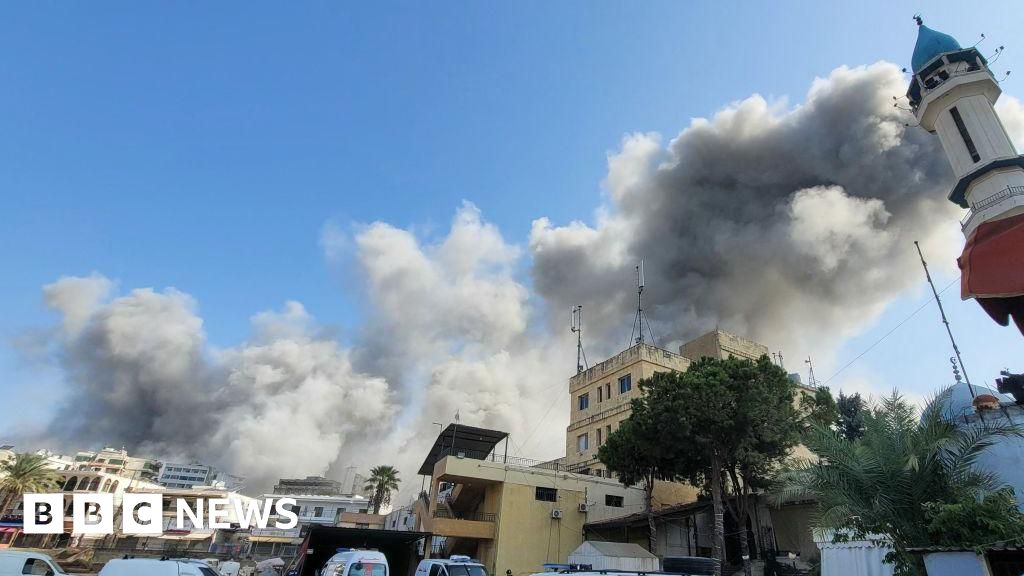Mayor and 15 others killed in Israeli strike

The UN’s special coordinator for Lebanon has criticised Israel after air strikes on municipal buildings in the southern city of Nabatieh killed the mayor and 15 other people.
Jeanine Hennis-Plasschaert called the killing of mayor Ahmad Kahil “alarming” and said any violations of international humanitarian law were “completely unacceptable”.
At least five of those killed in Wednesday’s strike were municipal staff co-ordinating aid for civilians remaining in the area, Nabatiyeh Governor Howaida Turk told the BBC.
Lebanon’s caretaker prime minister, Najib Mikati condemned the attack, saying it had “intentionally” targeted a council meeting.
The attack was the most significant against a Lebanese state building since the latest escalation in fighting, which began about two weeks ago, and has raised concerns about the safety of the country’s state infrastructure.
A spokesman for the Israeli military said its forces had launched raids targeting dozens of Hezbollah targets in the area and destroyed a tunnel used by the Iran-backed group.
“We know that Hezbollah many times takes advantage of civilian facilities,” Israel’s UN ambassador Danny Danon said at a meeting of the UN in New York City on Wednesday.
Turk, the governor, said that while the majority of Nabatieh residents had already left the area following heavy Israeli air strikes, the mayor and other municipal employees had stayed behind to help those who remained.
“This is just like strikes all over Lebanon,” she said.
“They [Israel] have hit civilians, Red Cross, civil defence. Now they have targeted a government building. It is unacceptable. It is a massacre.”
Previous strikes on Nabatieh over the past few days have destroyed historic buildings, including an Ottoman-era market dating to 1910.
Israel also launched at least one air strike against Beirut on Wednesday.
The strike, which hit the southern suburb of Dahieh, was the first on the Lebanese capital in five days. It came after a reported intervention by the US in which it urged restraint over the bombing of the capital.
Residents of Dahieh had begun to return to the area over the past few days, taking advantage of the apparent pause in bombing to check on their homes and retrieve clothes and other possessions.
Several told the BBC on Wednesday that the area resembled a ghost town, with rubble and debris from buildings littering the streets.
The strike on Dahieh came just hours after a US state department spokesman Matthew Miller publicly expressed concern over the “scope and nature” of Israel’s bombing of Beirut.
Mr Miller said the state department’s concerns had been “made clear to the government of Israel”.
An Israeli military spokesman said that prior to striking Beirut, “numerous steps were taken to mitigate the risk of harming civilians, including advancing warnings to the population in the area”.
Israel has faced criticism this week over its warnings, which Amnesty International has called “inadequate” and “misleading”.
The human rights charity said the warnings did “not absolve Israel of its obligations under international humanitarian law”.
Israel has expanded its air campaign in recent days, launching an unexpected strike in the far north of the country on Monday.
The strike, which destroyed a large residential home that had been rented by a displaced family in the Christian village of Aitou, killed 23 people, according to the Lebanese health ministry.
Twelve of the dead were women and two children, the ministry said.
The UN human rights office called for an investigation into the Aitou strike, saying it raised “real concerns” with respect to international humanitarian law.
#Mayor #killed #Israeli #strike
News plays a pivotal role in our lives by keeping us informed and connected to the world. It serves as a critical source of information, offering updates on current events, politics, economics, science, and more. Through news, we gain awareness of global issues and local developments, helping us make informed decisions in our personal and professional lives. News also fosters discussion and debate, encouraging critical thinking and perspective-taking. Moreover, it promotes transparency and accountability among governments, businesses, and other institutions. In a rapidly changing world, staying updated with the news enables us to adapt to new challenges and opportunities, shaping our understanding of the complexities of society. Ultimately, news is not just about information; it empowers us to participate actively in the world around us, contributing to a more informed, engaged, and responsible global citizenry.
Health is fundamental to our well-being and quality of life, making it an essential aspect of daily existence. It encompasses physical, mental, and emotional aspects, influencing our ability to function effectively and enjoy life fully. Prioritizing health allows individuals to maintain optimal physical fitness, reducing the risk of diseases and promoting longevity. Mental health, equally crucial, affects our cognitive abilities, emotional stability, and overall happiness. Investing in preventive healthcare through exercise, balanced nutrition, and regular medical check-ups helps in early detection of potential health issues, ensuring timely intervention and treatment. Beyond individual benefits, a population’s health impacts societal productivity and economic stability. Governments and organizations worldwide emphasize public health initiatives to address pandemics, health disparities, and promote overall well-being. Ultimately, health serves as the foundation upon which we build our lives, influencing our ability to pursue goals, nurture relationships, and contribute meaningfully to society.
Money plays a crucial role in our lives as a means of financial security and freedom. It enables us to meet basic needs such as food, shelter, and healthcare, while also providing opportunities for education, travel, and personal growth. Beyond material comforts, money facilitates social connections and experiences that enrich our lives. It empowers individuals to invest in their futures, whether through savings, investments, or entrepreneurial ventures, thereby fostering economic stability and growth. However, the pursuit of wealth should also be balanced with ethical considerations, as money can influence relationships and societal dynamics. Responsible management of finances is key to achieving long-term goals and mitigating financial stress. Ultimately, while money is a tool for achieving aspirations and fulfilling desires, its true value lies in how it is utilized to improve both personal well-being and the broader community.
Earning Easy Money in 2024: Opportunities and Considerations 💸
In 2024, the landscape of earning easy money presents diverse opportunities, albeit with considerations. The digital age offers platforms for freelancing, online trading, and e-commerce, allowing individuals to leverage skills and creativity for financial gain. Cryptocurrency investments continue to allure with potential for quick profits, yet they entail high volatility and risk. Moreover, the rise of the gig economy enables flexible work arrangements through apps and websites, offering quick payouts but often without job security or benefits. Passive income streams such as rental properties and investments in stocks or bonds remain viable, but demand initial capital and ongoing management. Amid these options, caution is essential to avoid scams and unsustainable ventures promising overnight success. Ultimately, while the allure of easy money persists, informed decisions, diligence, and a long-term perspective are crucial for sustainable financial growth and security in the dynamic year ahead.






